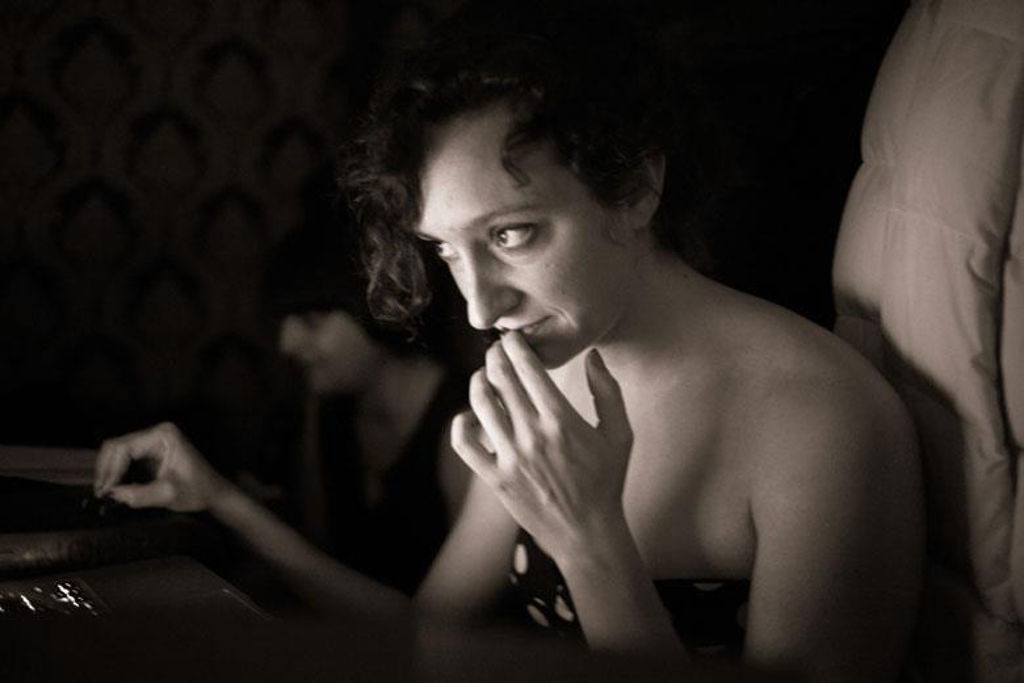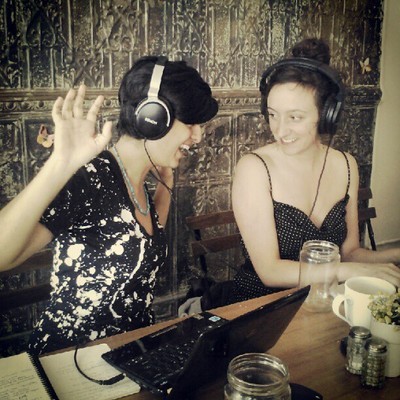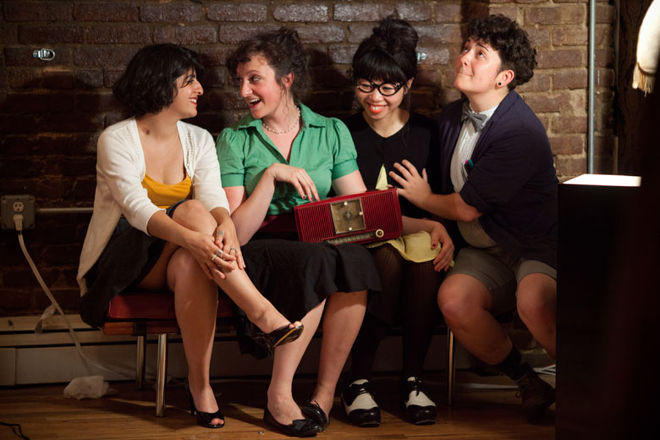‘The Heart’: How To Make A Career Out Of Love, Sex And Podcasting
It's called The Heart, and if you're not listening to it, you should be.


Brought to you by Heineken
We’ve teamed up with Heineken to introduce you to some men and women who have chosen to go beyond their borders, challenge the status quo, say ‘why not?’ instead of ‘it can’t be done’ — and as a result have made the world a more interesting place for the rest of us. For more people worth watching, head here.
–
“I love love…but it’s complicated,” said Kaitlin Prest the first time she spoke to me. I was listening to her podcast, The Heart. The episode was called Fu*k Love. Of course, Kaitlin wasn’t really speaking to me. But honestly, it felt like she was. Her voice was low and intimate. As though she was talking to me in the middle of the night after we’d happened to wake up at the same time.
“I think that’s one of the funnest things about what’s happening in radio now,” she says, actually speaking to me this time. “I think that’s why This American Life changed things in such a huge way. Because suddenly the host – they’re not talking to a room full of people, they’re not addressing the masses, they’re addressing you.”
Kaitlin Prest is the Host and Creative Director of The Heart, an addictive and beautiful podcast. She describes it as a “very intimate look into the way that people actually are when they’re in love or having sex”.
“The people that you hear on our show are the people who aren’t conventionally sexualised in mainstream media, so like people who are old, people who are fat, people who are queer, people who are women, people who are women who don’t shave their armpits, people who are trans or homeless or, you know, any of the things.”
The Heart began as radio show called Audio Smut on the Montreal community station CKUT. After studying and working in art, theatre, political science and social work, her introduction to radio was through a guy at a party who had his own show on CKUT that he invited her along to. “I remember just walking in there I was like ‘Woah, this is a place I could be every day for a long time’. You know when you just walk in somewhere and you have a feeling? And you realise in that moment that you’ve just opened the door into a universe that you are going to inhabit for like a chunk of your life? That’s how it felt.”
Audio Smut began with the premise that sexuality is shaped by culture, and that pop culture is the main way that that our values systems are shaped. Instead of making radio which discussed sex, or dissected sex, they made sexual content for listeners to have a new reference point when thinking about sexuality. Most of the culture we consume represents women in a particular way; Audio Smut wanted to create something real. Stories of women stashing weed in their vagina at the airport or stories of women shamelessly and furiously jerking off in a bathroom. “It wasn’t about the attention and it wasn’t about being shocking. It was just like, let’s be real about it.”
Traditionally, sexuality on the radio has a health or love focus. Listeners ring in with questions and they’re given advice. The women behind Audio Smut wanted to create something entirely new. They fought against the idea that the only time we talk about sex is when there is a problem that needs fixing. “We’re trying to access that experience of telling a story that inspires you and makes you feel things and makes you forget yourself in a way but that at the end of it you feel kind of like your vocabulary for life has expanded.”

Audio Smut has now evolved into The Heart, but the aims of the show have remained essentially the same. The latest episodes have included camp bunkmates late at night, tangled hair creating a private cave for kissing, and a grandmother explaining how “necking” grew to mean “touching his genitals”. The smut left the show title last year, but it hasn’t left the content.
Audio Smut became an independent podcast in 2012, when Kaitlin and senior producer Mitra Kaboli moved to New York from Montreal. Without a studio, a lot of the magic is made out of Kaitlin’s bedroom. Blankets are nailed to the inside walls of her wardrobe, so that the sound stays in a small place and doesn’t bounce about. “We have pitch meetings in my backyard.” says Kaitlin, “We drink shandies during our pitch meetings.” She says her closest friends are always the people she’s making The Heart with: “something happens whenever you’re spending long hours in your bedrooms making radio together at night.”
Kaitlin lives in Brooklyn now where there’s a thriving community of radio makers. They meet up for ‘Radio Club’ every month and stories are shared and workshopped. For Kaitlin, it was a huge part of feeling part of a creative community, “where we could talk and share and like play shit you know? Especially before we were on any sort of network or had any sort of audience it was so great to show off a piece and hear how it sounds in a room.”
At the audio conference Third Coast in November 2014, Kaitlin co-presented a workshop on sound design where she called for the producers in the room to treat making radio like an art practice. Tinkering and learning and making things doesn’t have to be about the piece of radio you are making, it can be about getting better as an artist and creating things you’ve never heard before. It’s an approach you can hear in Kaitlin’s work. Sound design for The Heart is intense, layer upon dreamy layer. My favourite episode, Movies in Your Head, is an example of this, the layers of sound: Kaitlin telling the story, Kaitlin’s thoughts, Kaitlin and her new lover whispering to each other, music from a stranger’s headphones, music she imagines other characters are listening to, music that just sets the mood.
The way reality and thoughts are rendered in The Heart comes the closest to mirroring a person thinking as any media ever has for me. In The Heart, falling in love isn’t just something that happens between two people, speaking or kissing or acting out scenes. It’s also everything that happens parallel – in our minds, in our past, to our bodies. In almost every episode, The Heart achieves the thing radio makers everywhere want to do. Make the listener think “Yes! I know! Why hasn’t anyone else said it out loud before?”

“I think that any good artist is scanning constantly for that little kernel of a question in the collective unconscious that’s just dying to be answered,” Kaitlin says, when I ask if this is what they’re going for, or if it’s a byproduct of making beautiful radio about sex. “I think that constantly probing and digging within yourself to get at those questions is a practice that I think the best makers are constantly partaking in daily.
“That’s when you have your technical ability at such a state that when that moment comes within the collective unconscious you’re in a position to act on it immediately and get something out.”
In 2015, The Heart became part of Radiotopia, a network of story-driven podcasts from PRX, anchored by Roman Mars, the host of 99% Invisible. “I feel like I’m in fucking radio heaven, it’s awesome,” Kaitlin says, “They really really give us full creative control. And that’s unheard of. I mean when it comes to people giving you money, they always want to have some say. And they’re not saying anything. They’re really letting us do what we’re doing.”
–
Jess O’Callaghan is a co-Executive Producer of All The Best, and the producer of the Re-Readers podcast. Previously her writing and radio has appeared on the Meanjin podcast, Right Now, Something You Said, AWOL and Farrago.